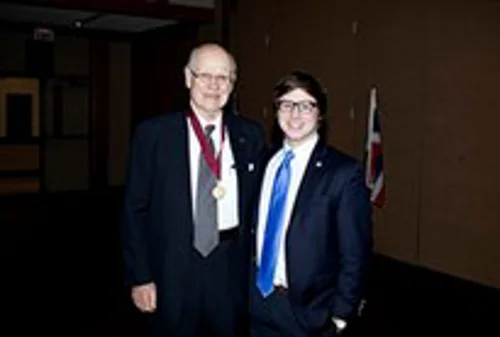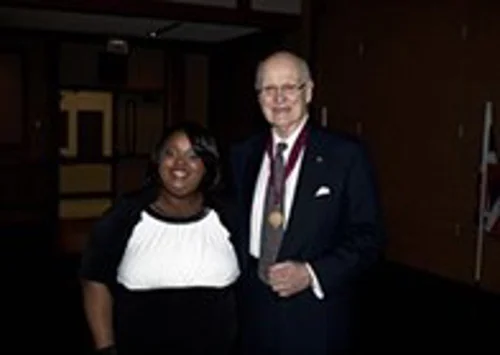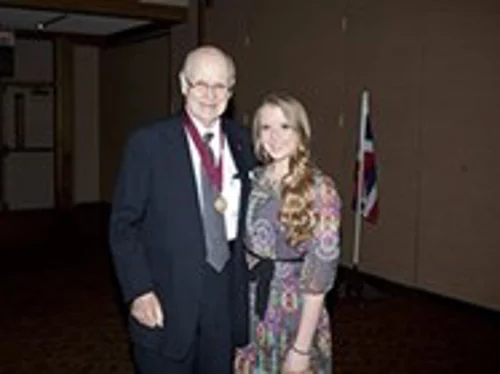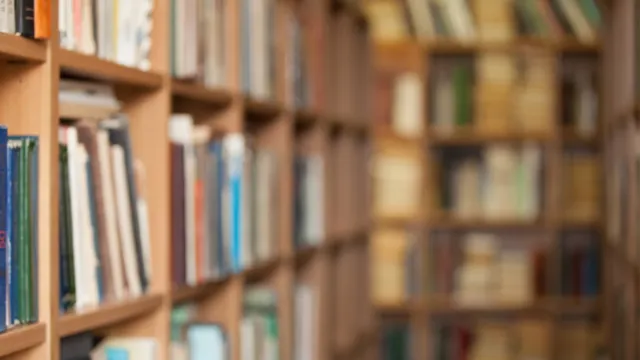NSHSS Scholars competed in an essay competition to have the opportunity to sit with Mr. Nobel at the International Services Council of Alabama’s 50th Anniversary Celebration in Huntsville, Alabama on Thursday, March 5, 2015.
Essay Question: In what ways do you support citizen diplomacy and how have you participated in the exchange of ideas, cultural traditions, or other experiences?



Andrea Augustine
Eagle’s Landing High School, Stockbridge, GA
Class of 2017
Francis Bacon, an English philosopher, once said, "If a man be gracious and courteous to strangers, it shows that he is a citizen of the world." At the end of the day, no matter what nationality, religion, or race we are, the fact remains that we are all citizens of Earth. And what better way is there to kindle a diplomatic relationship than to express respect to others and show that we are unified to achieve a similar goal- in this case, the promotion of international development in all aspects economic, political, and cultural. Most people think that individually, one cannot influence international relationships and endeavors. However, nothing can be further from the truth. Every citizen has the right and responsibility to pop the little bubbles that we exist in and interact with those of other cultures. The hardest part in doing this is realizing that we have the power to influence and enrich others. As for me, I do my part in supporting citizen diplomacy by sharing my experience as a first generation immigrant, exchanging academic and scholarly knowledge that I have acquired, and by being an enthusiastic numismatist. An idea that is universally understood is that of dreams. Dreams of a better life for my family gave my parents the courage to leave everything and everyone they knew back in India and immigrate to America. When I speak to others about this matter, I often see respect reflecting from their eyes for my family. Communication about deep personal experiences is just one way that I support citizen diplomacy. My parents’ courage continues to inspire me every single day, giving me the push and motivation to do well in my studies and other academic ventures. Another way I support citizen diplomacy is through the exchange of academic ideas that I have accrued with those around me. The exchange of ideas is the basis for meaningful interactions and relationships. My experiences with the National and Georgia State Science Fairs, FBLA Region and State Conferences, National Student Leadership Conference, Model Atlanta Regional Commission, and Youth Leadership Henry have all given me much knowledge and leadership skills. With these tools at hand, I have participated in many meaningful interactions with others, discussing the things that I have learned. Finally, we have my hobby- numismatics. Numismatics has helped me grasp a wider understanding of history, geography, politics, economy, and religion. It has given me a true appreciation for art and not to mention, developed my organization skills. It also happens to be a great conversation starter, for those of us who have difficulty in that area. In conclusion, every citizen has the right and responsibility to participate in citizen diplomacy through the exchange of ideas, cultural traditions, and other experiences. Through citizen diplomacy, ordinary people can help promote economic opportunity, peace, and stability. If each of us did our part in supporting citizen diplomacy, I am positive that the world will be a much better place for us and for generations to come.
Grayson Everett
Buckhorn High School, Huntsville, AL
Class of 2015
The richest and most dynamic way to become involved in the cultures and dialogues of countries whose borders are different than ours is by citizen diplomacy. It is of my opinion that one does not need to wear the title of Ambassador to accomplish this; nor does one need access to the illustrious structures that reside on Embassy Row in Washington D.C. The flourishing of knowledge, ideas, experience, and culture takes place by default when engaging in citizen diplomacy. It is a piece of utmost international integrity to ensure such a practice not only takes place, but is fostered by all participatory countries and individuals who wish to enrich themselves and those of contrasting destinations. This past fall, I was selected to serve as a citizen diplomat; representative of not only my school, but of my community, and more broadly my country. In this capacity, a handful of other students and I welcomed a delegation of incredibly impressive students from the United Kingdom. The likes of whom were in town to learn more about the civil rights movement and how its implications govern day-to-day life presently in the south. Charged with fostering a dialogue between the students of both of our respective lands, I was deeply moved by how quickly the conversation turned into a narrative. What was taking place was citizen diplomacy. No formal badges or destinations required. We were gathering their predetermined understandings of both our way of life and way of thinking, while they plugged in their current basis of comprehension into our receptive faculties, in order for the sum of all students, regardless of territory, to unite around our common desire for the acquisition of culture, knowledge, and understanding. Citizen Diplomacy can often be very informal − personally enriching those involved in order to share the story and carry on the tools that builds bridges between groups and countries. The 14th Dalai Lama stoically and honorably said in his acceptance speech of the Nobel Prize, “Responsibility does not only lie with the leaders of our countries or with those who have been appointed or elected to do a particular job. It lies with each one of us individually.” That coinage has been a motivation to me to always in order to build those cultural bridges everywhere I go. As an aspiring student of culture and foreign policy, I wholeheartedly believe that the endowment of citizen-to-citizen, person-to-person diplomacy is the most effective way to break the chains of cultural ignorance that plagues much of the world. I have experienced such enrichment firsthand and will always support such the noble cause of citizen diplomacy.
Emily Foulke
East Limestone High School, Athens, AL
Class of 2015
Being the child of a military family, I have had the opportunity to travel around and outside the country and experience new communities. With each new community came the opportunity for me to learn about the history of the area and enjoy the local customs. I have always been the “new girl” at school every couple years and have had the opportunity to share my unique story with people. It wasn’t until my junior year in high school I learned what it was like to learn from the “new girl.” Our school hosted a foreign exchange student from Italy for a school year. Her name was Catarina and she had the bubbliest personality. She was immediately a big hit. When Catarina first came, it was similar to when I first moved into the area. There were nonstop questions and judgment about the simplest of things. People wanted to know everything about her, like they did me. I understood the barrage of questions. Now I was one of those people with the litany of questions. Even though I had traveled overseas, I had never been to Italy. I wanted to know everything about her, her family, her town, how the schools were and so much more. Catarina and I shared a common bond. We felt like outsiders coming into a tightly knit, deep-rooted community. I developed strength and independence to forge my own path, like Catarina was doing. We accepted what was different about us, yet took the time to explain the cultural and regional differences to our peers. While we may have been different, we focused on the similarities we all shared. My rural Alabama community rarely sees people from other cities and states. Practically everyone’s family grew up locally in this small town. Most people are Baptist and go the same churches. Kids grow up together going to the same daycares and schools sharing the same experiences. Since people are raised together, they develop similar opinions, beliefs and knowledge. When someone different comes in, it challenges those beliefs and causes them to become more open-minded and think about the world that exists outside of what they know. With Catarina sharing her culture by teaching some of her language and history, as well as me sharing with our classmates my experiences, we affirmed there is so much more outside of the few square miles of our community. I believe this open-mindedness helps people discover more and realize how much the world offers. With new found curiosities people discover new things. A simple introduction to someone different than you can lead to learning about a new culture. You can meet the people they know, which in turn can cause a domino effect. This domino effect will expand your knowledge. Learning about others and accepting the differences creates diversity. Diversity broadens your horizons, adds excitement to your life and creates opportunities.
Teilei Hall
Stewarts Creek High School, Smyrna, TN
Class of 2016
I first delved into citizen diplomacy when I became a People to People student ambassador in 2011. The primary goal of this organization, which was founded by Dwight D. Eisenhower, is to help young people become more globally aware. For me, it changed my entire interpretation of life. After working on many projects, we traveled to Europe. While there, I faced many challenges like helping construct a fort and walking through the once perilous Mauthausen concentration camp. In contrast, I also had many blissful experiences like climbing up the stairs to get to the top of the Eiffel Tower and making pasta from scratch with my Italian homestay family. These opportunities were so eye-opening that I was no longer the same person. I now felt like an entity in this world rather than just some kid from America. This experience gave me a sense of purpose that continues to guide me through my high school career. I find myself more and more attracted to the cultural aspects of different places around the world. During my freshman year of high school, I joined Model United Nations, and the next summer, I had the opportunity to travel abroad again. During my sophomore year, I attended a brand new high school where I took AP Human Geography which informed me about the crises facing miscellaneous nations in the 21st century. I also learned how to contemplate possible solutions to some of these issues. Additionally, I began studying French, the language which I dearly love. In French class, we learn about the different cultures of French speaking nations. Moving up from French Club vice president last year to the president this year, I have become responsible for linking my own community to other French speaking communities. Last month, we wrote children’s books about our lives in French and sent them to a village in Togo. To me, these books are more than just entertainment for children; they could possibly change how adult villagers may view Americans and even contribute to a more unified world. Hopefully soon, we are going to skype with another high school in Paris. One day, I hope to be fluent in French so that I can reach out and experience even more opportunities across cultural and intellectual boundaries. In a more casual way, I promote citizen diplomacy by maintaining strong friendships with buddies that I’ve met overseas and online. I am proud to say that my international relationships are among the deepest connections I have ever experienced, and they have played a tremendous role in my development as an accepting, tolerant human being. I am also a member of the Cultural Diversity Club at my school. At our meetings, we share our different cultures and sample exotic cuisines from cultures around the world that are prevalent in our own school. I like participating in this club as an African American because it brings me closer to my peers while decreasing the prejudice and cultural boundaries that threaten to separate us.
Magdalene Isabel Smith
St. Bernard Preparatory School, Cullman, AL
Class of 2016
Because of travel, modern technical knowledge and incredible exchanges of information though the internet, one would now expect that citizens of the world have respect for, and acceptance of, the differences between themselves and others. Were that the case, the logical result of that respect and acceptance would be what we all wish for, world peace. Why would you initiate a conflict with a neighbor you understand and respect and one who understands you? Most wouldn’t. I think we all know that it is worthwhile to put effort into fostering respect for and understanding of other cultures. Though I have not yet had the opportunity to travel abroad , I have had the experience of attending a wonderful multicultural school. At that school there were students from twenty five different countries. The opportunity to share meals, classrooms and sports activities with girls from around the world opened my eyes to the things we have in common. Whether from Europe, Asia, the Middle East, South America, North America or Africa, these girls were just like me in that they wanted to please their parents, impress teachers, make good grades, listen to music, talk about boys, excel in sports, be popular and just have fun. While at school together, we girls knew there were differences in the colors of our skin, our cultures, and our religions. However, it was our small shared experiences which formed the backbone of our growth in understanding. We didn’t call these interactions “cultural exchanges” or recognize ourselves as “citizen diplomats” but in retrospect we fit the bill. Here are a few examples of small connections. The Ghanaian girls were introduced to, and found that they loved the singer Beyonce. A German student discovered American pop tarts and liked them so much that she had American friends mail Pop Tarts to her in Germany after leaving school. A friend from Korea introduced me to Korean BBQ. I was able to introduce that same friend to Southern BBQ and Milo’s Tea, which she loved. It wasn’t all about food. There were many times when we had the opportunity to comfort each other when homesick, to help each other with school projects, and to talk about “girl problems”. These and many other small shared experiences contributed to what I think will be lifelong friendships between many of us girls. While I usually associate the word “diplomacy” with State Department officials and high level politicians, in this new fast world of travel and of global connection, we should recognize and seize situations where we have the opportunity to be citizen diplomats and promote respect and understanding. My school friends and I didn’t solve any world problems, but in our own simple ways, though our interactions, we were, for that short time, being “citizen diplomats” each for our own countries.
Alethia Jordan
Lee High School, Harvest, AL
Class of 2015
Community Service and volunteerism are very important to me for many reasons. One, it would take the focus off of me and make me more aware of the world and people around me. Taking part in community service and volunteering has taught me compassion and understanding. The good feelings you get when you're able to help somebody out are more rewarding than a paycheck. Community service and civic oriented activities has helped me develop better interpersonal and leadership skills. I am super dedicated to working with my high school Beta Club and the National Honor Society. I participated in many community service projects; projects such as singing for various organizations with my chorus class also volunteering at the Liz Hurley Breast Cancer Awareness 5K Marathon giving the runners cups of water during the race. I also loved volunteering for Salvation Army Christmas Charities wrapping gifts for the children as well as packing boxes with food for the families in need. The project, which I enjoyed most though, was volunteering for Habitat for Humanity and helping rebuild a home. The organization Habitat for Humanity is a nonprofit, ecumenical Christian housing ministry. That seeks to eliminate poverty housing and homelessness from the world, and to make decent shelter a matter of conscience and action. I chose to volunteer at Habitat for Humanity because my aunt recommended it to me who had volunteered for them for her job. My aunt told me that it was an experience, which I would never forget, and I didn't. Even though I only worked there for a day unlike my Aunt who had volunteered for a week it felt like the best feeling in world knowing that I was helping a family get shelter for themselves and have a new start in a new home. This feeling made me realize that even the littlest things can help someone else and we can always be doing little things throughout the day and our lives to help those in need or not as fortunate as ourselves. This feeling also helped my relationship with God it drew me closer to Him and gave me a better understanding of my mission for others. As I move through life I think I will always be involved in community service. Not just because I think it is important but because it is something I enjoy and look forward too. I love bringing joy and love through community service I feel I can accomplish that. I hope to inspire others to go out in their community and make a difference. All in all I know that I can and will make a difference in people's lives every day.
